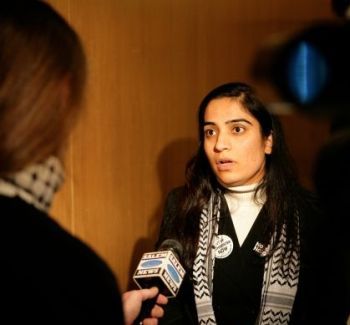
Publisher:
Bonnie King
CONTACT:
Newsroom@Salem-news.com
Advertising:
Adsales@Salem-news.com

~Truth~
~Justice~
~Peace~
TJP
Mar-13-2012 16:24

 TweetFollow @OregonNews
TweetFollow @OregonNews
Women's Participation in Afghanistan's Elections
Salem-News.comIn Afghanistan, there is no one blueprint for a successful female candidacy.
 Salem-News.com's Tim King interviews Afghanistan politician Malalai Joya. Photo by Dexter Phoenix |
(KABUL) -
 Faces of Afghan women |
Thousands more have competed for positions in parliament and the provincial councils. A new AREU paper explores some of the dynamics of women’s participation as candidates and voters in these elections, drawing on conversations with successful and unsuccessful female candidates, along with men and women in six study communities spread across Balkh, Bamiyan and Kabul provinces.
It finds that there is no one blueprint for a successful female candidacy, and the stories of individuals interviewed for this study were as diverse and complex as the various political environments in which they operated.
In almost all cases, successful candidates ultimately secured victory via a combination of good access to financial resources, ties to a powerful family or a political party, and—often most importantly—a strong relationship with a given community or other constituency of voters. Significantly, surprisingly few female candidates chose to court female voters.
Women voters in the research communities generally had reasonably unhindered access to the ballot box, and understood how to cast their votes. However, their voices were shut out of the community-level discussions so vital to electoral politics in contemporary Afghanistan.
Although they were rarely forced to vote for a given candidate, the refusal of their husbands to talk politics with women in their households left many of them struggling to make informed choices. Nonetheless, taking part in elections had a deeply positive personal impact on many of the women in this study, providing a vital affirmation of their equal rights in the eyes of the state, boosting their self-confidence and raising hopes for changing the existing status quo.
Equal Rights, Unequal Opportunities by Oliver Lough, with Farakhloqa Amini, Farid Ahmad Bayat, Zia Hussain, Reyhaneh Hussaini, Massouda Kohistani and Chona E. Echavez is now available for download at www.areu.org.af. Printed copies as well as Dari and Pashto translations will be available at a later date.
About AREU
The Afghanistan Research and Evaluation Unit (AREU) is an independent research based in Kabul.
AREU’s mission is to inform and influence policy and practice through conducting high-quality, policy-relevant research and actively disseminating the results, and to promote a culture of research and learning. To achieve its mission AREU engages with policymakers, civil society, researchers and students to promote their use of AREU’s research and its library, to strengthen their research capacity, and to create opportunities for analysis, reflection and debate. AREU was established in 2002 by the assistance community working in Afghanistan.
Articles for March 12, 2012 | Articles for March 13, 2012 | Articles for March 14, 2012

googlec507860f6901db00.html
Salem-News.com:



Terms of Service | Privacy Policy
All comments and messages are approved by people and self promotional links or unacceptable comments are denied.
[Return to Top]
©2025 Salem-News.com. All opinions expressed in this article are those of the author and do not necessarily reflect those of Salem-News.com.